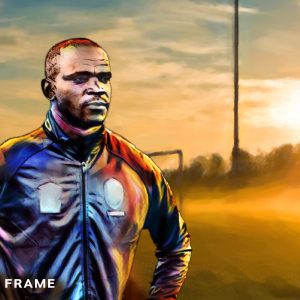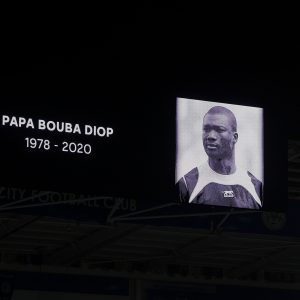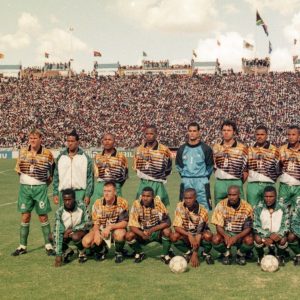Mandla Ncikazi is SA football’s quiet coach
The Golden Arrows coach refuses to blow his own horn despite his success at Abafana Bes’thende so far and in South African football over the years.
Author:
11 February 2021

Look up Mandla Ncikazi online and you are not likely to find a wide range of articles telling you about his incredible journey as a footballer and, now, as coach. It needs a bit of digging to get the full story. “I actually had someone asking me that,” Ncikazi says, in reference to there not being much about him on the internet.
Ncikazi is no Pitso Mosimane, Gavin Hunt or Benni McCarthy. At a click of a button, you get countless stories about how much this trio has achieved in their careers. But Ncikazi, the Lamontville Golden Arrows coach, is unknown to many football supporters despite his long career in the beautiful game.
Born in Hlokozi in KwaZulu-Natal, Ncikazi played professionally for African Wanderers and AmaZulu. But his career was ended prematurely by a bad Achilles heel injury. He then worked as a school teacher before becoming a sports officer at the Department of Education. He eventually focused on coaching, working in the lower divisions before taking up a role as assistant to Manqoba Mngqithi at Golden Arrows. Together they won the MTN8 title and put the Durban side on the map. He later became an assistant coach at Polokwane City, Free State Stars and Maritzburg United. And, for short stints, served at junior national team level in-between.
When he finally got to be head coach at Maritzburg in 2015, after Steve Komphela left to join Kaizer Chiefs, Ncikazi saw it as an opportunity to show what he can do. But he lasted only five matches in the hot seat.
Related article:
“I think I have coached in every football division in this country,” said Ncikazi, who turns 53 on 16 February.
“I coached in the Castle League. I coached in the ABC Motsepe League, if you use the current terms. I coached African Wanderers, Nathi Lions. And I worked at Durban Stars as an assistant to Fani Madida. I then moved to Arrows in 2007/08, if I am not mistaken, to work with Manqoba. For whatever reason, Google chooses certain people. Maybe it’s the humble beginnings… how I grew up.”
Ncikazi goes on to reflect that the reason he is not a household name might be because he does not toot his own horn, saying:
“With us, even in an interview, you can’t praise yourself because it’s a weakness. It’s different from the current generation that takes pride in praising themselves. There’s one coach who is in the PSL right now who praises himself and his achievements. For me, I don’t like to praise myself. You can’t do that… it’s a weakness, that’s how I was raised. People must praise you.”
Related article:
The opportunity to become head coach became available again when Steve Komphela left Arrows before the start of the current season to join Mamelodi Sundowns. He immediately got down to doing the job of coaching. And his tenure could not have started any better, with Arrows consistently in the top eight since the start of the campaign.
In fact, until their defeat to Cape Town City towards the end of January, Arrows were one of only three teams in the DStv Premiership not to have lost a match. “It’s miraculous to be where we are currently, based on a number of reasons. Arrows was coached by a big-name coach. I hope I don’t say anything to offend coach Steve because he is a brother. I can narrate a big page just to talk about Steve. A big coach left Arrows and I am sure you journalists expected a disaster after Steve left, obviously so.
“An unknown who failed at Maritzburg is now taking over. It does not give positive vibes that anything will be better than what Steve did. The team is currently going well. But I must also thank the players because those are the people who accepted me. I thank the technical team for accepting that the journey must continue and that we must try to improve things. I must also thank the chairlady [Mato Madlala] for having the confidence that I might be the suitable candidate.
“I can imagine the calls of doubt, the thoughts that she might have gone through. She took the biggest risk of her life, of giving a failure her R100 million to carry. For that, I must thank her. It was very bold of her to take the decision to give me the podium. I understand the environment at Arrows. I’ve been there for a long time. I understand the ins and outs, what to do and what not to do. Some of the players who are playing for the team now, I’ve known them for years. Some were nine years old and others were 14. I must also thank the coaches I have worked with before, Manqoba and Steve. They did not treat me like a ball boy.”
An eye for talent
Throughout his career as a coach, Ncikazi has discovered and nurtured talent in KwaZulu-Natal. He has an eye for young talent, and this is where he feels he has been most successful. Players such as Bongi Ntuli, Andile Fikizolo and Siyabonga Dube have come through his hands.
“Steve taught me something. He told me that there is visible success and invisible success in football,” Ncikazi said. “Visible success is where a coach lifts a trophy, like Coach of the Month and Coach of the Year. That’s visible success. And that’s the one that is seen by the public, and the journalists will talk about it. But invisible success is not known by the whole world. But it’s still success, like the opportunities you give, and the livelihood you give to people, without going public and telling the whole world that so and so has this success because I gave it to him. I do have a lot of invisible success, but not yet a lot of visible success. I hope that one day I will also have stories of visible success going forward.
“It’s the ability to see people who come from humble beginnings. I always believe that if I grew in an area where resources were there, and not like in the farm where I did, then I would have had better opportunities and I would have been a better player and I would have played earlier than I did, because I started playing [professionally] when I was already a teacher. I think I was 23. But when I look back at my quality and discipline, if I had gone through the right stages of development, I would have been a better player.”
Related article:
With Arrows’ limited budget, having a head coach who is able to spot rough diamonds and then refine them is important. The club’s business model is centred around finding raw talent, refining it and then selling it to teams with deep pockets. This is where Ncikazi is important for the club, outside of being head coach.
“What inspired me is that I wanted to assist others to get better opportunities than what I got. Also, I am not somebody who likes fashion,” he said. “I think South Africans are very fashionable in how they perceive players. There’s an ordinary player, but because the name is big and maybe he plays for a big club, he will be seen as a good player. Not because of his ability, but because of his name and brand.
“So, I can see a person playing and is unknown and I can make him known, based on his talent. I can see talent that is not seen by everybody. I still like virgins in football, someone who has not been touched by anybody and you can give them an opportunity in football. Although they might not do well early, they will grow and be better.
Related article:
“For example, there’s [Nkosinathi] Sibisi at Arrows, the defender. I believe that currently he is the best defender in the Premier League. Not because he is at Arrows… ask Steve the same question. It’s just that he is not playing for a fashionable club. I think stats can also concur with me, that currently he is the best defender in the country. But people will see me as a crazy coach to say the statement that I am saying. But I wouldn’t be shy to say that, even with the whole world going against that statement. But I believe I am correct in what I am saying.”
Even though Arrows have started the season well, Ncikazi isn’t getting carried away. “I don’t want to be over ambitious. I am a very cautious person. Don’t shift the goal posts just because the results seem to be positive. We work in groups of five. If we get a minimum of eight points in a group of five games, and there’s six groups out of 30 games… So, 48 points takes you to the top four or top three. I have not changed the objectives just because the team has started well,” Ncikazi says.
He is a man with a plan.




